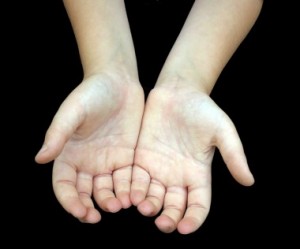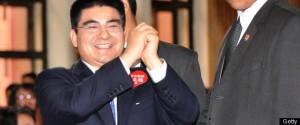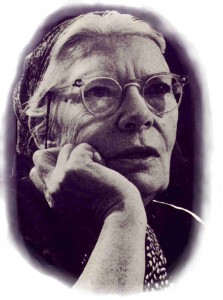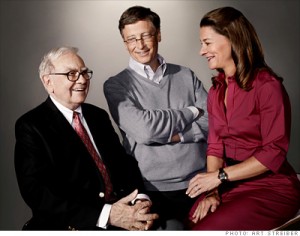“But when you give alms, do not let your left hand know what your right hand is doing.” [Matthew 6:3]
[1] Let not your left hand know what your right hand is giving. [2] Chinese billionaire philanthropist Chen Guangbiao in Taiwan. [3] Chinese philanthropist Lee Choon Ping handing over cash to sick girl’s mother
On our first visit to the Norbertine Abbey in Tongolo, Belgium, in 1989, we were shown a place where loaves of bread were distributed to the villagers through an opening in a concrete wall during the war. Drastic reduction in agricultural production always came in the wake of wars. Food became scarce and villagers had to rely on the abbey for even basic sustenance. To save the villagers from embarrassing themselves in coming to collect bread, countless loaves were dispensed in that manner without the giver and recipient meeting face to face. The oven never stopped baking, so long as there were people pulling the bell for bread. But the guest-master added, “It was also one way of practicing the teaching that our left hand should not know what we gave with our right.”
As far as we know, every religious and ethical tradition in the world encourages charitable acts in which neither is attention drawn to the giver nor is the recipient made to feel demeaned or undignified.
A Chinese billionaire philanthropist from the mainland went on a charity trip to Taiwan in 2010. Whether he was wantonly distributing red envelopes (hongbao) filled with cash to individuals or staging elaborate displays of donations to established charities, Chen Guangbiao (陳光標) vehemently practises flashy philanthropy, carried out with much fanfare. To be sure, he came bearing gifts, huge gifts, some NT$500 million (US$17.2 million) for the poor in Taiwan. He wanted, he said, to reciprocate Taiwanese generosity towards the Sichuan mega-earthquake relief, to share wealth from fellow Chinese in China with the needy in Taiwan, and to encourage wealthy businessmen to do likewise. He succeeded in giving away quite a bit of money and raked in a great deal of publicity too, not all of which was positive. But he also kicked up a huge storm of controversy in the process. His trip offers a useful starting point for dialogue on some different ways people do charity and on philanthropic questions. We choose three issues for dialogue in this post.
[1] Demeaning the Poor?
Chen nearly did not get to make the trip. As his reputation preceded him, the Taiwanese authorities had legitimate concerns before issuing him the visit pass. They feared his ostentatious ways of doing charity might offend some Taiwanese political sensibilities, and they considered whether doling out cash in a public line-up might not make the poor look bad.
An elderly lady who waited for Chen at his hotel received NT$70,000 and wept in gratitude. The poor lined up in designated stations and received NT10,000 each. Minor scuffles occurred everywhere he went, and some desperately resorted to capturing his attention by kneeling and crying to him for help, making sensational headlines on prime time TV news and causing critics to give Chen a taste of the sharp end of their tongues for causing the “Taiwanese poor” to stoop to such shame. Sensing the heat, Chen pulled back and scaled down his “hongpao distributing” itinerary.
It is easy to feel a sense of “unseemliness” about Chen’s philanthropic spectacle. The trouble is, one cannot deny the incessant voice of approval from the poor themselves who are Chen’s immediate beneficiaries. When poverty stares you in the face and you struggle desperately to cope with the demands of daily existence, the last thing you need is listen to charity in an academic discussion, or wait in a welfare office for hours or days to finally feel the touch of a gift in your hands. As Archbishop Desmond Tutu once said, “The good news to a hungry person is bread.” Talk is cheap. To the poor, charity is useless if it is not concrete and immediate. And so, to the poor who received cash gifts at the long queues everywhere he went, Chen is a saint whom they vehemently defended by lashing back at his critics with words like, “What is wrong with lining up to receive cash assistance when we really need it? We are poor. We can use some help so we may have a better Chinese New Year. Mr Chen helps. He helps now. He really helps, on the spot. We are deeply grateful for his generosity. You are well to do. You are not poor like us. You talk. You don’t like what he is doing. But what do you do for us here and now? Do you know how we would live through this Chinese New Year without his hongpao? Do you even want to know?” Indeed, critics talk and then they leave. But the poor remain poor and the hungry remain unfed. Jesus did not call us to write beautiful theses on poverty and methods of poverty-eradication. He broke the bread and gave. The good things we have received in life are blessings meant to be multiplied and shared. Our calling is to pass the bread.
We should add that, to a young man who knelt before Chen pleading for financial assistance, he refused to give a dime. Instead, he insisted that an able-bodied young man ought to work to earn his own keep. Had the young man joined the queue and not put himself up as a special case, he would have received the same “hongpao” like everyone else.
Another argument for labeling Chen a counterfeit philanthropist draws on the suggestion that there is no free lunch in this world. He is, after all, advertising himself at home just as he is seeking to build a good image overseas. But why are these critics so mean to Chen and yet are generous on their praises for the Singapore Government for giving money to its people, never without its media hype? The Singapore Government, to its credit, distributed some 6.6 billion S$’s worth of “hongbao” last year out of its huge surplus. It did so by plowing back this huge amount of cash to its citizens through various benefits. To be sure, any skeptical observer can say that the political leaders of Singapore were keeping an eye on the upcoming general elections, but that would be to ignore the fact that Singapore does this plow-back exercise every year.
From another angle, even when pure altruism is lacking in a philanthropist very visibly doling out cash under media spotlight, and he actually feels good in the accolades that he gets, why do we seriously discount the goodness of his act? In this regard, another high profile Chinese philanthropist, Lee Choon Ping (李春平), makes for interesting studies. Lee gives a lot, always to the seriously poor, especially to the underprivileged from the rural regions of China. One commonality marks all his gifts: they are all in cash. Why? “If you wish to help someone,” he says, “it is best you do so in the most direct way possible. If you wish to make a donation, then concretise it by making a true and honest donation.” Imagine what he would think about all those pledges people make towards charitable causes, many of which the organizers are unable to collect afterwards!
Lee’s operative principle is the same for us Christians: If you want to do good, do so now and in a genuine, concrete fashion. Talking about doing charity and the love of God is useless unless it is concrete – something people can feel, can touch, and can experience in the here and now. Soon after he was elected and named Pope John XXIII, the phone network in the Vatican broke down. Speaking to the engineer who did not know who he was, the Pope learned of his hardship of living on low wages and bringing up a family. Three months later, against advice, the Pope implemented a 50 per cent pay rise for all those working for the Vatican. Against the Vatican bureaucrats’ argument that the money could be better saved for charitable causes, the Pope warned of charity becoming justice deferred.
In August 2011, Lee went to Guizhou to do charity. Saved from death buried under a mudslide 43 years ago when he was a soldier, he wanted to make return-gifts in gratitude. During the flight, he read of a small girl needing urgent bone-marrow transplant but the family was too poor to pay for the surgery. He went straight to the hospital and handed a heap of cash – RMB300,000 in total – to the girl’s mother. In fact, when the media fiercely, but mistakenly, attacked Lee for placing the heap of money right next to the head of the sick child for photo-taking [it turned out that after Lee had left the hospital, the child’s mother did so at the request of reporters!], the child’s father said angrily: “Mr Lee threw us a life line. Without his life-saving cash, our child might be dead by now. We are simple country-folks, and we don’t have much culture, but we know that where life is absent, there is no dignity to talk about. Our whole family is deeply grateful to Mr Lee. We just do not understand why the media are so relentless in asking irrelevant questions.” It is interesting to hear Lee say very candidly, that he enjoyed giving away money to the poor. It makes him feel good. What about all those accolades? “It’s very nice to hear about them. When people applaud what I do, I feel happy inside.” Sounds pretty much like an interior bliss – a reward from on high, perhaps? – and he is openly honest about it. And why should the rest of the world begrudge him feeling rewarded inside for doing good deeds?
How would a radical alternative approach to Chen’s look like?
We remember feeling in awe when we first read a story about Dorothy Day. Together with Peter Maurin, she co-founded the Catholic Worker movement in America in the 1930s. It was a non-violent, pacifist movement that continues today to combine direct aid for the poor and homeless with nonviolent direct action on their behalf. A firm believer in equitable distribution of wealth, she lived a radical discipleship where her heightened sense of Christian stewardship was akin to Gandhi’s concept of trusteeship. She would, for example, on pay-day reserve for herself such amount as she needed for upkeep, and leave the rest of her salary spread out on the table in the bedroom of the workers’ hostel where she lived. Leaving her bedroom door open while she went out for a walk, she allowed other residents who were in need to come in and take whatever they needed for their families, sparing them the embarrassment of being seen by her. Her actions were truly saintly. We cannot get that picture out of our minds ever since we read that story. Many things could be said about her gracious actions. They certainly resonate well with St Basil, a fourth century theologian and monastic who wrote:
- “If one had taken what is necessary to cover one’s needs and had left the rest to those who are in need, no one should be poor, no one would be in need.”
[2] Announcing One’s Alms-Giving?
Chinese sages taught us to do good without notifying others for recognition. Chen Guangbiao does not buy that. Comparing wealth to water, Chen holds: “If you have a cup of water, you can drink it alone. If you have a bucket of water, you can store it at home. But if you have a river, you need to learn how to share it with others.” Doing charity is far from a simple outing, according to Chen. His motto is not to become the rich second generation, but the charitable second generation. He thrives on the philosophy that from doing charity, one gains meaning in existence. Then, he insists, doing charity in a public fashion helps generate a healthy impetus for other wealthy people to follow suit.
The Americans have a great tradition of doing charity. Even then, many Americans would be quite uncomfortable with Chen’s style. And yet, critical of the American way of doing charity, Julie Clawson writes: “Charity in America is unfortunately often not an act of selfless compassion, but instead is a way for people to feel good about themselves or gain something in the act. We don’t just give money to charities; we hold expensive galas and silent auctions that reward us for our act. Politicians and celebrities earn brownie points for telling the world how much they give. Charity, for many Americans, always is an act of self-aggrandizement at the expense of suffering people.”
Christians return to Jesus’ graphic teaching on this business of doing charity: the left hand should not know what the right hand is doing!
Do “left” and “right” carry any directional significance? In real life, both hands are connected to the same body, so they work together and know what the other is doing. In Christian art and language, however, they are used in the symbolic sense, the “right hand” referring to the things of God, and the “left” the things of this world. In classical paintings, the left hand is often associated with the sinful hand of humanity and its “dark” doings, while the right hand points to the merciful and saving hand of God.
In his Sermon on the Mount, Jesus taught against a way of doing charity that is aimed at getting the admiration or praise of society. Drawing a clear contrast with those givers who publicised their gifts, he instructed that no one should be informed how much you give: it is between you and God. As a rhetorical device or figure of speech, “left” and “right” hands are intentionally used here as a hyperbole. Deliberately exaggerated, they aim to evoke strong feelings or to create a strong impression. Jesus’ point is that reward lies in heaven from where the Father watches in secret.
Matthew puts Jesus’ teaching in context:
“Beware of practicing your piety before men in order to be seen by them; for then you will have no reward from your Father who is in heaven. Thus, when you give alms, sound no trumpet before you, as the hypocrites do in the synagogues and in the streets, that they may be praised by men. Truly, I say to you, they have received their reward. But when you give alms, do not let your left hand know what your right hand is doing, so that your alms may be in secret; and your Father who sees in secret will reward you” [Matthew 6:1-4]
What then is true kindness? Jesus places true kindness in a context of humility, of doing righteous acts not for the motive of being seen by others, but simply because it is the right thing to do. This was spoken at a time when generally speaking the Jews very openly presented their tithes in the temple, making a big show of their religiosity, particularly among the wealthy, rather than out of simple obedience to God.
[3] Publicity as Catalyst?
Chen, seemingly influenced by Gates and Buffet, has hoped that his charity trip to Taiwan would also inspire the Taiwanese wealthy to more consciously and intentionally embark on doing charity.
Writing for WSJ Blogs, Robert Frank said the rich people in America “sneer at” direct cash give-aways to the so-called poor in society. He assesses the big time American philanthropy thus: “The fad among today’s venture philanthropists is to target their dollars to solve a larger social problem, not give away cash to the poor. Accountability, measurability and efficiency are the buzzwords among today’s American givers.”
One needs only to turn to stories on the Blessed Mother Teresa of Calcutta, or books like Gregory Boyle’s “Tattoos of the Heart” and Christopher Heuertz and Christine D. Pohl’s “Friendship at the Margins”, to know that what is truly important is not success [accountability] but our faith, not results [measurability] but our work, and not efficiency but steadfast commitment in the face of repeated failure.
And yet, no one should discount the genuine good in what Gates and Buffet are doing, the shocking magnitude of their generosity, and the pristine originality of their vision. Pledging practically their entire colossal wealth to charitable causes, they have led the way in persuading the world’s wealthiest to give back to society what they have received from society. They give flesh to the wisdom that “to whom much is given, much is demanded”. Gates, his wife Melinda, and Buffett have asked U.S. billionaires to give away at least half their wealth during their lifetime or after their death, and to publicly state their intention with a letter explaining their decision. A total of 57 billionaires have now signed their pledges, including the young Facebook co-founders Mark Zuckerberg and Dustin Moskovitz. Taking the lead as they do, Buffet and Gates are doing something truly beneficial for society.
Their Giving Pledge does not accept money or tell people how to donate their money but asks billionaires to make a moral commitment to give their fortunes to charity. In his statement after giving $100 million in September to the beleaguered public schools of Newark, New Jersey, Zuckerberg said: “People wait until late in their career to give back. But why wait when there is so much to be done?”
What Gates and Buffet have done and continue doing is create a window of opportunity to encourage philanthropic practices. If we judge their tree by its fruits, there is simply no denying that the harvest is great, even as they continue to conscientise the rest of the world. Some super-rich in Asia are already following their footsteps, and society as a whole is the beneficiary.
[1] “Servant of God”: Blessed Dorothy Day [2] Warren Buffet, Bill and Melinda Gates [3] Mark Zuckerberg of Facebook
Copyright © Dr. Jeffrey & Angie Goh, May 2012. All rights reserved.
You are most welcome to respond to this post. Email your comments to us at jeffangiegoh@gmail.com. You can also be dialogue partners in this Ephphatha Coffee-Corner Ministry by sending us questions for discussion.






